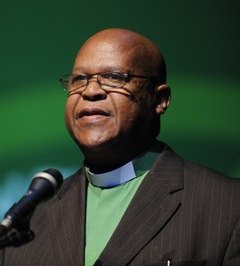Justice and Peace in Africa: Where to Start? Where to Go?

Contact: World Council of Churches, +41 79 507 6363; www.oikoumene.org/press
GENEVE, Feb. 27, 2017 /Standard Newswire/ -- As the World Council of Churches (WCC) adopts a regional focus on Africa for its pilgrimage of justice and peace during 2017, Rev. Dr Andre Karamaga, general secretary of the All Africa Conference of Churches (AACC) reflected that the entire continent has reached a crossroads at which it must make the right choices.
Photo: Rev. Dr Andre Karamaga. ©Peter Williams/WCC
"When we talk about focusing on Africa with regard to the pilgrimage of justice and peace, we have a problem to know where we start and where we are heading to, because in our globalized world, peace is conditioned by internal and external dynamics," he said on behalf of the AACC on 21 February.
He spoke during a meeting of the Reference Group for the Pilgrimage of Justice and Peace, held 20-27 February in Nigeria.
To understand where Africans are headed, one needs to take time to understand where they are from and the journey they have gone through, Karamaga reflected.
"We will never stop reminding the world that Africa has existed from time immemorial, without external assistance," he said. "On the contrary, it has been a space where people immigrate in search of food and security."
If contemporary statistics indicate world Christianity is gradually shifting to the African continent, other evidence shows the continent is full of suffering and poverty which undermine human dignity, he continued. "We therefore have to interrogate the depth of the contradiction that shows on one hand the massive response to the call from the Gospel for the fullness of life and on the other hand the abundance of misery. What is the content of the hope that the church preaches, where there is hopelessness?"
A growing number of young people are leaving the continent, Karamaga continued. "They leave massively through the agony of sinking in the Mediterranean Sea and a number of them perish in the Sinai desert, victim of human trafficking," he said. "It is as if there is no more hope for our young people in the continent, because they do not see any possibility for a better life."
The time has come for all on the African continent to make the right choices, he said. "It is a matter of life and death, for whichever choice we make defines our fate and to some extent is irreversible."
Karamaga said he valued the AACC's collaboration with Muslim leaders and with other faith-based organizations, and he saluted the collaboration between the AACC and the WCC.
The World Council of Churches promotes Christian unity in faith, witness and service for a just and peaceful world. An ecumenical fellowship of churches founded in 1948, today the WCC brings together 348 Protestant, Orthodox, Anglican and other churches representing more than 550 million Christians in over 120 countries, and works cooperatively with the Roman Catholic Church. The WCC general secretary is the Rev. Dr Olav Fykse Tveit, from the [Lutheran] Church of Norway.




 Sign Up to Receive Press Releases:
Sign Up to Receive Press Releases: